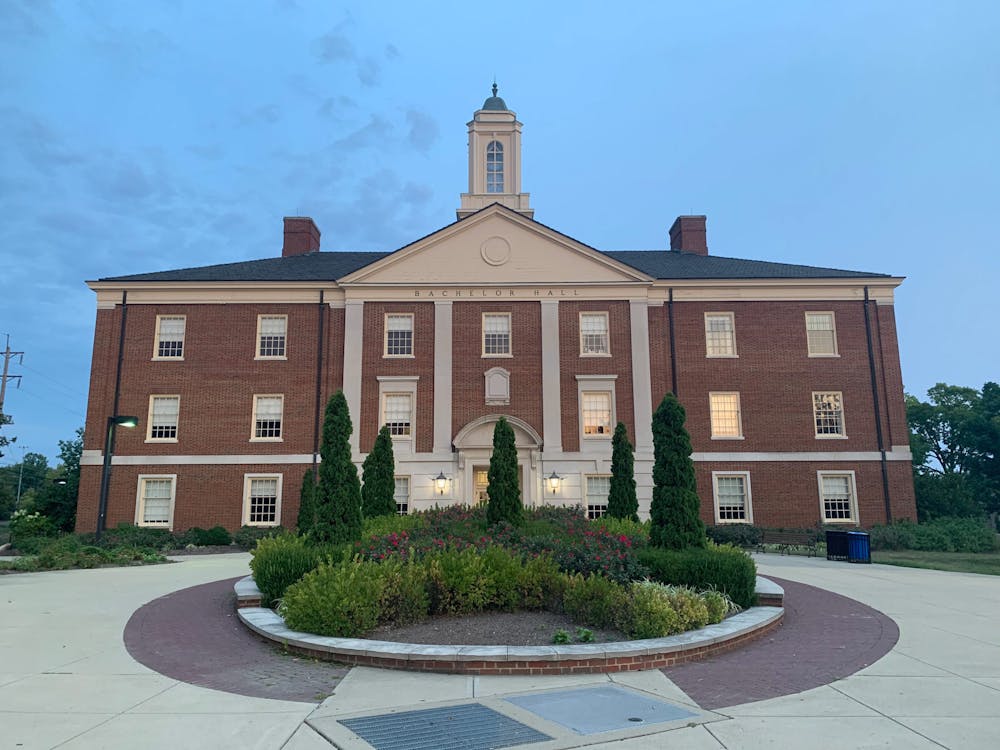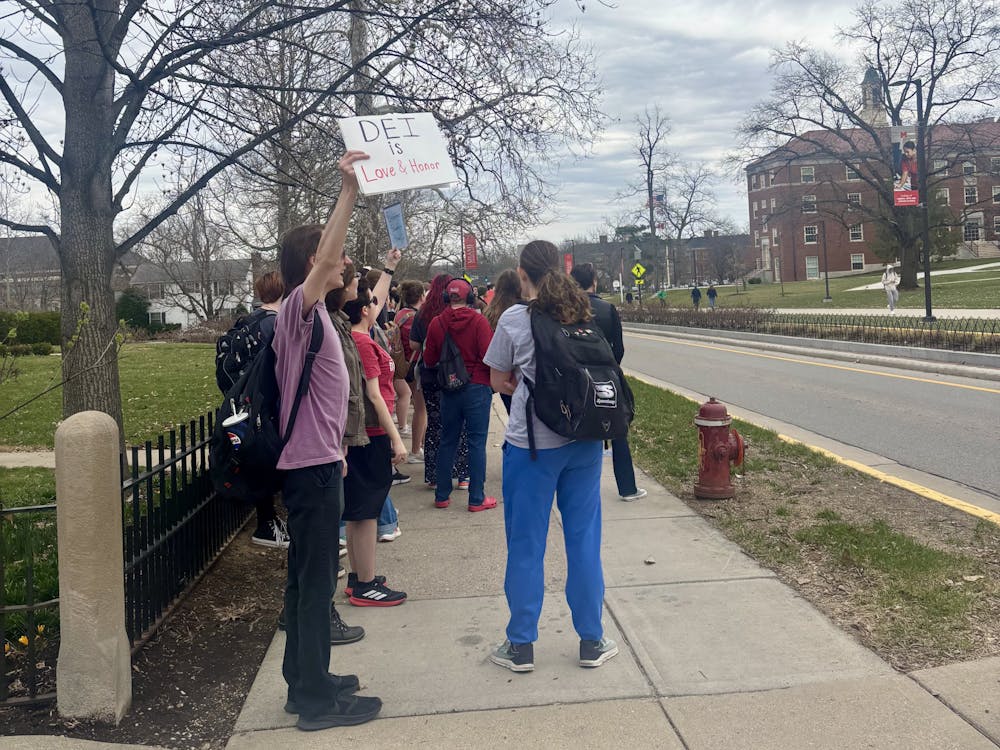After surviving two years of college in a pandemic, junior finance major Solomia Semenyuk was relieved that things were finally starting to look up.
Then her homeland was invaded.
”When the war started, that first week of school was really hard,” Semenyuk said. “I had three exams – I couldn’t take any of them. I did not do well in school at all.”
Semenyuk, a first generation Ukrainian-American from Cleveland, Ohio, was born in the U.S. one year after her parents moved here. She has many friends and family living in Ukraine.
“I had to call all my Ukrainian friends, all of my relatives and see what they were planning on doing,” Semenyuk said. “Having those surreal conversations of ‘Are you going to escape Ukraine?’ [and] ‘Can you leave Ukraine?,’ was really sad.”
Semenyuk said her despair goes beyond concern for her family’s safety.
“It’s less about even my family – the entire country is my family,” Semenyuk said. “The fact that our nation has been suppressed for so many years and has to endure even more suppression is very upsetting.”
Desperate to help in any way they could, Semenyuk and her Ukrainian friends at Miami organized a bake sale to raise money for a local service group in Lviv, Ukraine whose name translates to “church of the ascension of the lord.”
“The service group essentially buys the exact needs of the army, drives it to the front lines and brings it to them,” Semenyuk said. “We decided to use this organization because my grandfather personally works with them and so does my mom.”
Semenyuk and her friends sold cookies in Armstrong and Chick-fil-A at the Phi Delt Gates. They raised about $3,000 after spending only $200 on supplies.
The money will be sent to the service group, where it will be used to buy grocery items, health care products and even military equipment for the army.
For Whitney Fisch, executive director of the Hillel chapter in Oxford, the Russian invasion felt a lot more personal after she heard that the Hillel building in Ukraine had been bombed.
Enjoy what you're reading?
Signup for our newsletter
“It floored me,” Fisch said. “I couldn’t imagine our Hillel house here in Oxford blown to bits.”
Despite being thousands of miles away, Fisch felt she needed to do something to help.
“We baked over 100 challahs in 48 hours,” Fisch said. “We raised incredible funds, we had two community members and Miami alumni reach out to us and offer matching donations.”
Fisch said she chose to raise money for psychological services for youth affected by war because it “seems like something that everyone can get behind.”
The fundraiser raised about $2,750 in total. People with and without personal connections to the conflict showed their support through donations and purchases of baked goods.
“We had people donate … who it resonated with because their parents were Holocaust survivors, or their parents are Ukrainian Jews who couldn’t be Jewish in Ukraine and just wanted to celebrate the efforts of Jews leading this cause,” Fisch said.
While fundraising is a primary way of supporting those affected by the conflict, simple acts of kindness are another way to offer assistance.
Nastia Evstifeeva, a first-year doctoral student studying biochemistry, came to the U.S. from Russia in 2015. She has family and friends in St. Petersburg, Russia, and in Ukraine.
“My parents are [in Russia] and there isn’t much I can do,” Evstifeeva said. “I want to help them, but I don’t know how.”
Evstifeeva said the conflict has put a strain on her friendships with Ukrainians.
“Since [the war started] the connection with them hasn’t been the same,” Evstifeeva said. “I don’t know how to talk to them … I don’t know if I say something to them whether it’s gonna help them or make them more upset.”
Evstifeeva said the amount of support she’s received from the Oxford community has been overwhelming.
“A lot of people have come up to me and asked if my family is okay and to let them know if I need any help,” Evstifeeva said. “I honestly didn’t expect people to be so nice.”
While Russia has been the subject of international condemnation, Evstifeeva said the backlash has mostly been directed towards the government and not toward all Russian people.
Molly Heidemann, director of International Student and Scholar Services, said Miami doesn’t have any students from Ukraine, but she reached out to international students from Russia to offer support.
“Some appreciated the support, others were really quite concerned about the conflict,” Heidemann said. “One even had family relatives in Ukraine and was really stressed about it.”
Heidemann said the biggest concern expressed by Russian students was related to economic sanctions that have made it difficult for them to access money.
“They seem to have at least enough money to pay for necessities at this point,” Heidemann said, “but were concerned about running out and not being able to pay for the fall [semester].”
Heidemann said her office only works with students who are in the U.S. on student visas, so it would be difficult to find and support students impacted by the conflict who live in the U.S.
“Students who’ve emigrated to the U.S. through their parents or have a green card … we don’t have knowledge of them,” Heidemann said. “They would probably have to self-identify or present themselves as being in that situation and needing support.”
Semenyuk said she is grateful for the support she has received from Miami students and faculty, but she still holds herself accountable for staying on top of her coursework.
“[My professors] have been very understanding, but it’s not like I can just slack off on school and not take my exams,” Semenyuk said. “Obviously my day-to-day I spend thinking about Ukraine, but I have to channel my energy into school because I have no other choice.”
Oxford may be halfway across the globe from Kyiv, but Fisch attributed the role of social media to garnering such an international response.
“24-hour news cycles allow us, for better or for worse, to feel like we’re there,” Fisch said. “It also seems like such a David and Goliath experience … there is such an obvious aggressor in a way that’s never really been this obvious.”
Semenyuk pointed to economic and political factors, such as disruptions to the global economy and the threatening of a democratic state, as reasons for the high U.S. participation in support efforts.
“It’s a global issue with two million refugees as of now,” Semenyuk said. “The fact that our global economy is being affected by this does make it personal.”
As of March 28, the number of refugees fleeing Ukraine has reached 3.9 million.
Samenyuk also said there are many people like her in the U.S. – and at Miami – who have personal connections to the conflict.
“We’re all very fortunate to live in America, but it does affect a lot of my friends,” Samenyuk said. “There’s a bigger Ukrainian community here than people may know about.”



